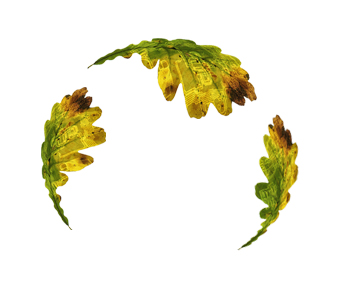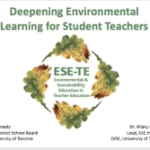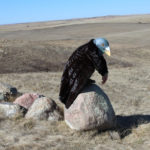Working as part of the EECOM family does have its advantages! We were honoured to work in partnership with the EECOM Board as they began to work on a new series of videos highlighting the work that is being done under its network. As one of its Standing Committees, our team focuses on better embedding Environmental and Sustainability Education in Teacher Education, which is a tight focus given the breadth of how environmental learning manifests in both formal and informal education settings across the country. At the EECOM 2018 conference in Cranbrook, members of the ESE-TE Committee were interviewed to help us communicate our mission and goals. The result is terrific, highlighting what our Committee is about, surrounded by the beautiful vistas of the Kootenays. If you haven’t seen it yet, catch it on our YouTube Channel! https://www.youtube.com/watch?v=EoI5ORCUsPw
NAAEE webinar partnership: Deepening Environmental Learning for Student Teachers
Thanks to a partnership with the NAAEE and their eePRO platform, our Standing Committee hosted a webinar focused on ESE in Preservice Teacher Education (PTE). Entitled “Deepening Environmental Learning for Student Teachers”, it featured examples of innovative practice from across Canada, such as faculties of education that have their own educational gardens, offer Land-based learning, collaborate with local NGOs, or ones that offer year-round programming in ESE for preservice teachers. Hosted by teacher educator Hilary Inwood and new teacher Alysse Kennedy, they shared what ESE in PTE can be from both faculty and students’ perspectives. A lively discussion ensued from those attending the webinar – over 50 people from across North America had registered, demonstrating the high degree of interest in this topic. If you missed this webinar, you can access it (and other excellent webinars) in the NAAEE’s archive at: https://www.youtube.com/watch?
ESE-TE at AERA 2019 in Toronto!
The American Educational Research Association conference, which took place in April in Toronto, was a great time for those working on the ESE-TE team to connect, discuss their research, and share it with a broader audience. Members of the ESE-TE Standing Committee were involved in a variety of presentations, helping to advocate for a presence for ESE in all levels of education. One of these highlighted the ways that ESE can take multimodal forms in preservice teacher education, which aligned with the theme of the conference. Paul Elliott (Trent) shared the benefits and challenges of integrating ESE with Indigenous Ed in a core preservice course, while Susan Gerofsky (UBC) highlighted the critical learning that takes place in UBC’s Orchard Garden with teacher candidates. Laura Sims (St. Boniface) analyzed community-based approaches to ESE in her faculty of ed, and Hilary Inwood (OISE) discussed the impacts of creating environmental art installations with teacher candidates. This session was very well-attended (with over 60 in attendance for a Sunday morning session), demonstrating the strong interest in ESE in Teacher Ed. There is talk underway of turning this into a book….stay tuned for more!
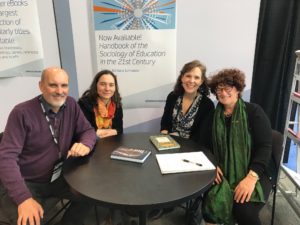
LtoR: Paul, Laura, Hilary and Susan
Canadian Journal of Environmental Education Special Issue Call for Papers
Environmental and Sustainability Education in Teacher Education (ESE-TE) remains a critical challenge for faculties of education across Canada. At a time when the impacts of climate change, biodiversity collapse, mass migration, and food and water shortages are increasingly evident throughout the country (Worldwatch Institute, 2018), the roles of educators at all levels of our education system are imperative to help Canadians make cultural and societal shifts to more sustainable forms of living. Teacher educators are key actors in this, given their influence on the education and training of pre-service and in-service teachers.
This special issue of the Canadian Journal of Environmental Education (CJEE) invites Canadian teacher educators to share their research on ESE-TE to raise and strengthen the profile of this developing field. Although not exhaustive, several questions arise: How are teacher educators in faculties of education contributing to this shift, from policy, praxiological, philosophical, theoretical, conceptual, methodological, curricular, and pedagogical standpoints? What lessons are being learned? What evaluations are being made? How are they impacting the field as a whole? What challenges are slowing down progress in this field?
The call was inspired by the Research Roundtable on Environmental and Sustainability Education in Teacher Education, hosted as part of the Canadian Network for Environmental Education and Communication’s (EECOM) annual conference in Cranbrook, BC. All Canadian teacher educators and scholars doing research in this area are welcome to submit works for review in any of the related discourses, for example – Environmental Education, Education for Sustainable Development, Environmental and Sustainability Education, Place-based Education, Sustainability Education, Nature-based Learning, Eco-Justice Education, or Traditional Ecological Knowledge and Wisdom, in relation to Teacher Education.
For more information, please contact Susan Docherty-Skippen (susan.docherty-skippen@brocku.ca). Please submit manuscripts through the CJEE author submission process – noting that the manuscript is for the ESE-TE themed issue. Guidelines for submissions, e.g., word length, publication style, etc., can be found on the CJEE website: http://cjee.lakeheadu.ca
Deadline for submissions is February 28, 2019.
Place-based learning: Natural history in Sudbury
Dr. Yovita Gwekwerere is cross-appointed between the Laurentian University Faculty of Education and School of the Environment. She offers a course in Environmental Education that is open to all students at Laurentian as an elective, for twelve weeks. Half of the class is usually Concurrent Education students, so it can really be an interesting and dynamic mix of backgrounds and expertise in the course. A core component of the course is getting the students outside and into the community, exposing them to local organizations that can support them as teachers and concerned citizens. Yovita has noticed that a really impactful experience for her students comes out of a very place-based practice, when they learn the Sudbury Story. Sudbury, Ontario, has a history of mining and logging, and the subsequent pollution that devastated the landscape. Thirty years ago, a successful regreening project began in the city, bringing in help from local and international scientists, and local community involvement, bringing back trees, air quality and other enhancements. Most students often do not know the Sudbury ecohistory. After learning some of the details, they also participate in a guided hike at the Jane Goodall Conservation center where they get to see one area that was left “ungreened” intentionally to highlight what improvements were made by the collective action between scientists and citizens. Many students comment after the course that they were greatly impacted by the hopeful message of the Sudbury Story. They also note that it is important to know the impact of humans on our natural environments so we don’t repeat the same mistakes. To learn more, contact Dr. Gwekwerere at ygwekwerere@laurentian.ca.
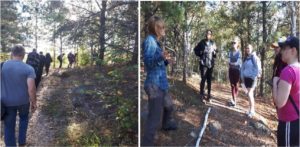
Learning about the story of re-greening Sudbury at the Jane Goodall reclamation trail, City of Greater Sudbury
EECOM Research Roundtable Reflections
The recent Research Roundtable hosted by the ESE-TE committee of EECOM was a success! We welcomed over 70 educators and researchers to this event, which took place on Oct. 18 as part of the 2018 EECOM conference in BC. It was such a pleasure to meet so many people dedicated to learning about how to better integrate ESE into both preservice and inservice teacher education. The Roundtable hosted over 20 research presentations; a sincere thank you to all of the presenters! These provided an excellent introduction to the variety of research being done in ESE-TE across Canada, and initiated many conversations around the importance of teacher ed that permeated the wider EE conference. The day ended with three break out sessions focused on: Indigenous Ed and ESE; types of supports, resources, and professional learning needed in this area; and how best to move forward in this work. These drew on the experience and expertise of those in attendance to identify what is needed to broaden and deepen the work being done in ESE-TE.
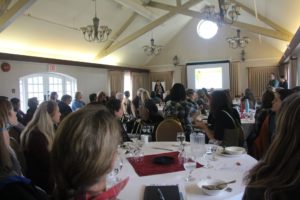
Many who attended the Roundtable have asked for more info on how to get involved in this work. Here are a few suggestions:
- join our network to get regular updates, resources and calls for involvement in ESE-TE
- deepen your understanding of the current praxis of ESE-TE
- share your work in ESE-TE in an upcoming issue of CJEE
- advocate for a clear presence of ESE in your local faculty of ed
Special Signature Event on Climate Change at CACS-ACÉC 2018
At CSSE at the University of Regina last May there was a signature event with a focus on Climate Change, organized by the Canadian Association of Curriculum Studies (CACS). According to the promotional materials, the goal of the sessions was to address critical issues of today’s world in order to engage a non-academic public and to make scholarly ideas accessible to everyday Canadians. I was only able to attend the third part of the planned event, which integrated the arts into public climate change education.
Organizer Paul Zanazanian (McGill) commented that the event “examines the challenges of climate change from several disciplinary perspectives. Our goal is to provoke thought and discussion, and hopefully activism, on this topic that is so important to all of us.” The event was co-organized and performed as well by Kathryn Ricketts (U of Regina).
The Performative art pieces, as a walking tour with durational art-making, took place in the green space that runs along campus, on the banks of Wascana Lake. Kathryn Ricketts presented a dancing embodiment of her bird-character Remington. This anthropomorphized bird wore a fur coat and a rubber pigeon mask, and moving to an internal music, it intermittently gave out all of its birdseed, and then came back looking for food, but by then many of the onlookers had dropped the seeds into the tall grasses under our feet.
Another evocative performance, facilitated by Sarah Schroeter and her third year Drama Education students (Allene Bautista Chernick, Robyn Dyck, Erin Goodpipe, Tara Hanson, & Sara Salazar – U of Regina), invited us into a formal dinner set under the Joe Fafard statue “Mind’s Garden”. Each of the courses of the imaginary meal became more and more confrontational, including the grizzled spine of a deer and ending with the “ashes of our children”. The takeaway of these interactive performances was the sense of provocation, dissonance, and necessity; in tackling climate change education, we must prepare for engaging in pedagogies of discomfort and for preparing our teacher candidates for this new reality.
Community partnerships enhance ESE in teacher education
How can community partnerships enhance ESE in teacher education? OISE’s Dept. of Curriculum, Teaching and Learning aims to find out. OISE is collaborating with the Toronto District School Board’s EcoSchools program to integrate preservice and inservice professional learning on ESE on a broad scale to explore the benefits of bringing novice and experienced teachers together. This is not a new idea, as Faculties of Ed often lead workshops for teachers, and teachers model ESE for teacher candidates during practicum. What makes this collaboration innovative is its scale and commitment. Unfolding over three years, this initiative involves a wide variety of workshops, talks, and experiential events; a cohort of teacher candidates focused on ESE; an annual conference and Ecofair; practicum placements; an Action Research team; and intensive summer courses. It aims to support learning in a range of ESE traditions, including nature-based learning, place-based ed, eco-justice ed, as well as include a strong presence of Indigenous ways of knowing. A 3 year research study is investigating the experiences of all of the participants. This ambitious project hopes to demonstrate new ways for school boards and Faculties of Education to collaborate on meaningful, impactful approaches to moving ESE forward. For more info on this project: https://www.oise.utoronto.ca/
VISIONING ENVIRONMENTAL AND SUSTAINABILITY EDUCATION IN TEACHER EDUCATION: TOWARD A NEW ACDE ACCORD, from CSSE 2018
At CSSE at the University of Regina in May, our team was honoured to be involved in a session of the Association of Canadian Dean’s of Education (ACDE) called Visioning Environmental Sustainability Education in Teacher Education. The purpose was to gather ideas for creating an Accord on ESE in Teacher Education to be accepted by the ACDE at a future meeting. This session began with some members of our ESE-TE team sharing stories of their own journey and passions for EE. Yovita Gwekwerere (Laurentian) spoke about her upbringing in Zimbabwe and her work with Greenpeace. Patrick Howard (Cape Breton) spoke of his research with youth who have been impacted by the collapse of the Cod fishery in Newfoundland. Clinton Beckford (Windsor) shared his history in Jamaica and how island nations are being directly impacted by climate change through rising water levels. Maurice DiGiuseppe (UOIT) spoke about his proximity to nuclear power stations and the relationship of our built world to sustainability. Each of these stories evoked the complexity and uncertainty of climate change, and our role as teacher educators in addressing this. This was followed by a discussion by session attendees, many of whom are Deans of Faculties of Education across Canada, as to what has been done so far and what direction should an Accord take. It was decided that a draft Accord should be presented to the next ACDE meeting, with a clear rationale for the inclusion of ESE in Teacher Education, about its connections to Indigenization, and the importance of building partnerships in communities. This Accord should also emphasize the contextualized nature of ESE, embodied through a place-based approach. Our ESE-TE team looks forward to supporting the creation of this Accord for presentation at the next ACDE meeting in late October. If you have any thoughts or insight, please contact us.
A Natural collaboration in Indigenous and Sustainability Education in Cape Breton
The Bachelor of Education at Cape Breton University (CBU) in Sydney, NS has recently developed a Sustainability Concentration for some of the program participants. This concentration came out of rising focus on sustainability education that works hand-in-hand with the efforts to Indigenize the curriculum. The melding of Indigenous and sustainability education came together in ways that were expected because of the many intersections of these two approaches to teaching and learning, namely through community- and place-based education.
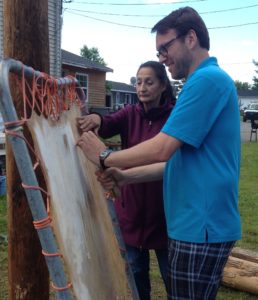
Figure 1 – Elder Sharon Paul shares how to prepare a hide with a teacher candidate
In order to develop the four courses that represent the concentration in sustainability, the program leads, over time, connected with local First Nations communities. The Eskasoni Mi’Kmaw Nation is about 40 km outside of Sydney and Membertou Nation is in Sydney. The new program emerged in 2009, and the leads knew they wanted First Nations education included, so they reached out to the communities and created dialogue. A First Nations concentration also emerged, with the focus on language preservation – also a strong sustainability issue – so the four course concentration in FN emerged at the same time as sustainability. Both evolved and intertwined organically.
